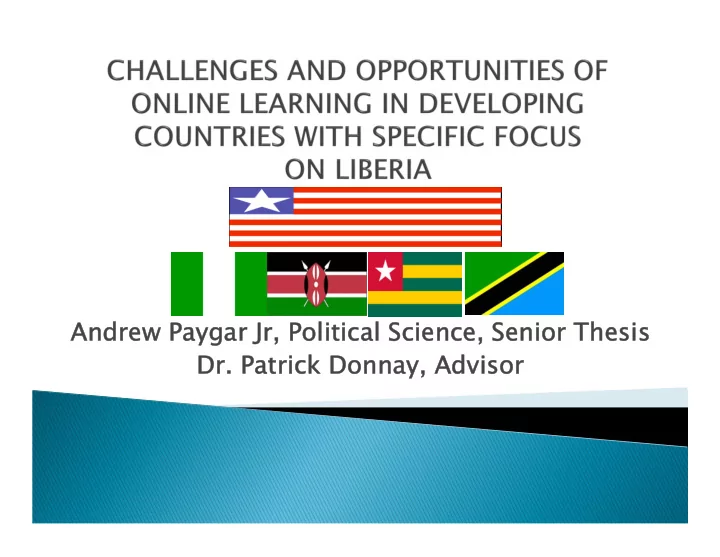

Andrew Paygar Andrew Paygar Jr, Political Science, Jr, Political Science, Senior Thesis Senior Thesis Dr. Patrick Donnay, Advisor Dr. Patrick Donnay, Advisor
It was originated1976 in South-Saharan Africa by the National Teachers Institute, Kadauna in Nigeria. The intention was to remove barriers and constraints that may prevent learners from accessing and succeeding in quality, lifelong education. It courses were predominantly through the print media. It helps encourage studies at home and help combat educational problems in the Nation. It geared towards educating growth competitiveness and reaching social and economic impact.
Developing nations will respond to increase demands of students. It reduces costs of education and increases participation of many students regardless of their locations. It provides students the opportunity to learn at their own pace. It creates an environment for students to collaborate on an assigned project without being at one locations.
Majority of the students attend public or government schools due to high tuition fees. Students and instructors will need to take fundamental computer courses. Partial view of class room in Liberia. Institutions lack relevant infrastructures. The country lacks of high bandwidth connections.
Learning can be difficult for students who are not familiar with the technology involved. Students do not have direct interaction with instructors and classmates. It can be difficult for students who are undisciplined or unmotivated. It involves spending on training of staffs and new technologies. Staff being trained in the lab.
United Nations Educational, Scientific and United Nations Educational, Scientific and Cultu Cultural Organization (UNESCO al Organization (UNESCO) 1945-Present 1945-Present ◦ Is working to improve the development of African countries educational sectors. ◦ It has been encouraging African governments and development partners to maintain education as one of its priorities. African Virtual University (AVU) 2003-Present African Virtual University (AVU) 2003-Present ◦ Makes efforts to increase access to quality higher education and training through information communication technologies ICT. ◦ To build sustain and enhance the capacity of African tertiary educational institutions. ◦ To implement research and evaluation activities on the African Continent.
Liberia was founded July 26, 1847 by free African slaves from the United States. It’s a country in West Africa bordered by Sierra Leone to its West, Guinea to its North and Ivory Coast to its east. Monrovia, is Liberia capital city Tropical, humid and raining season is the climate in Liberia. St John river, St Paul river are the largest river in Liberia Nimba Mountain is Liberia biggest mountain. Iron ore, Timber, Diamonds, Rubber, are Liberia natural resources.
Americo-Liberian rule (1847- 1980) The Country covers an area of 43,000 square miles. Suffered 14 years of civil crisis from 1989-2003 President is the head of state. Ellen Johnson Sirleaf a Harvard- educated banker and administrator is the current and He Her Ex r Excellen cellency, P y, Presiden ident t Ellen Johnson Sirle Ellen Johnson Sirleaf 24 th president of Liberia. 2006- Present.
Poverty Rate: 80% Unemployment rate: 85% and 201st compared to rest of the world. GDP: 8.3% and 11 th compared to rest of the world. Communication: Telephone: 2.394 million (2012) 138th compared to rest of the world. Electricity: 335 million kWh Workers at a Workers at a (2010 est.) 168th compared Construct Construction site on site. to rest of the world.
Potential is huge for Liberia educational system for online learning and technologies in the emerging years. Challenges: Are also huge and more so in Liberia due to destroyed infrastructure, including the educational sector, which was badly affected due to fourteen years of civil war. Questions?
Agency, Agency, C. I. (2014, C. I. (2014, April April 8). 8). The World The World FactBook FactBook . Retr . Retrieved from The World d from The World FactBook: FactBook: https://w ttps://www.c ww.cia.gov/library/pu a.gov/library/publications/the-w lications/the-world- orld- fac factbook/geos/li.h book/geos/li.html ml Education S ucation System i stem in L Liberia ria . (2012). Retrieved from Education . (2012). Retrieved from Education System in Liber System in Liberia: a: http://www.clas ttp://www.classbas sbase.com/Countries e.com/Countries/Liberia/Education- /Liberia/Education- System System Gajaraj, D. Gajaraj, D. (2001). Distance Educ (2001). Distance Education: Promise, Performance and ation: Promise, Performance and Potential. Potential. Commonwealth o Commonwealth of L Learning, Ca arning, Canada, 16 nada, 16 , 61. , 61. O, o. D., & O, o. D., & K, O. F. K, O. F. (2006, June (2006, June). The International Review of ). The International Review of Research in Open Resear in Open and Distan and Distance Learn Learning. Attitudes and Attitudes and Pe Perceptions o rceptions of S Students t udents to Op Open a en and Di d Distance L ance Learning i arning in Nigeria, 7 Nigeria, 7 , 1-6. , 1-6.
Recommend
More recommend